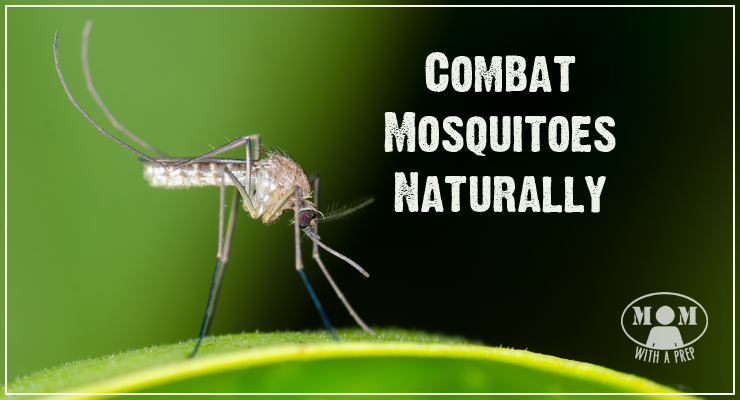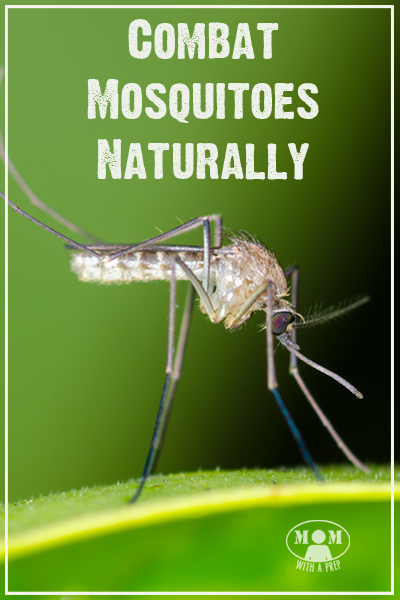Do you want a way to combat mosquitoes without spraying harmful chemicals on your body and yard all the time? Do it naturally!

It’s a scientific fact. I am a mosquito magnet. My husband and I can stand in the front yard at dusk on any given day, and you can look down at our legs and my legs are covered in mosquitoes, and he has two. I seem to be an all-you-can-eat buffet for the critters.
Then comes the itching, and the scratching and the whining (the whining is my husband asking me to please stop scratching, though he will say “I’m drawing your attention to it before you unconsciously reach bone, which you’d do if unsupervised.”)
I grew up in an era when spraying DEET or equally harmful chemicals on yourself and your yard was just the norm. And while I’m not going to say that I will never use DEET (because with all things, there are times when it is necessary), I am going to suggest that there may be other ways to combat mosquitoes naturally that can help on a day to day basis! But a spray of any sort should always be your last resort, not your first choice.
How do you combat mosquitoes naturally?
Empty your water sources.
Because mosquitoes breed in standing water, emptying all sources of standing water is imperative. A mosquito can go from egg to adult in 4-7 days, so I suggest you empty out sources two to three times a week, and especially if you water often.
- flower pots
- tires
- sculptures that may hold water
- poorly drained areas of your yard (this might take some planning to better control runoff and drainage)
- tree holes
- buckets (even if you store these upside down, the lip can collect enough water for mosquitoes to lay eggs)
- rain gutters
- poorly managed rain barrels
- overly wet compost piles
- tarps covering boats and pools
- water hose coils
- trash cans and trash
- kids toys and play scapes (these can collect water on the inside if created improperly, so you might want to drill a few tiny drainage holes in the bottom to help them release collected water if it is an issue)
- pet dishes
Fixing outdoor faucet drips, redirecting rain flow off your roof so that you don’t create a permanent wet spot, cleaning up the trash, and coiling water hoses upright instead of on a ring on the ground can be some home improvement ideas to help prevent water from pooling to create moquito havens.
Unfortunately, there isn’t much you can do if your neighbors aren’t also in this fight with you. Mosquitoes breed and can travel about a mile, but continue the battle, talk to your neighbors, move to Alaska (oh, wait, have you seen the size and the swarms that happen in the summers there?! EEK)
Encourage your winged population.
Birds and bats love mosquitoes. So encourage them to thrive in your area. And this doesn’t mean just in the summer. But throughout the winter for those species that stay in your geographical area so that they want to hang out at your place. While there are species of mosquitoes that love to hang out and feed on birds, you’re better off encouraging the birds to be there for more reasons than just the mosquitoes. This would mean creating an organic landscape for them, including water features. Evidence doesn’t suggest that any particular species is a proven mosquito hunter, creating an environment where you support the natural enemy of a mosquito can help with the adult population.
Stock your water features
If you have water features that can support fish, do it! Fish love eating mosquito larvae! There are even big movements out there to raise mosquito larvae to feed your fish (though I think they’re playing with fire — can you imagine them genetically modifying them to have more nutrients, and then something happens in the lab and then we have a mosquito zombie invasion? I don’t know if anyone can live through that! Maybe that’s when we need to employ flame throwers!
Gambusia fish, aka mosquito fish, are often suggested for fresh water features in control of mosquito larvae. However, they can be an invasive fish that eats other insect larvae, zooplankton and even other fish eggs, so some states control the use of them by permit only. Check your local regulations.
Use some donuts!
BT dunks – Bacillus thuringiensis ‘Israelensis’ aka Bti, are a great way to prevent egg laying in water sources you want to keep like water barrels, water features, bird baths, etc. Don’t confuse this with simple BT (bacillus thuringiensis that is effective for caterpillar control). They come in donut form, in pellet form or in liquid form. You can even break down the donuts and use just portions of them in your smaller water features. The bacteria in the dunk LOVE mosquito eggs 😉 It is completely harmless to bees, birds, dragonflies, etc.
There is also a liquid form of Bti that can be sprayed over an area to help control mosquitoes. Many in the natural/organic movement are encouraging cities to go to this form of spray which kills mosquitoes, black fly and gnats but doesn’t harm other beneficial insects and other vertebrates, along with using other essential oil combinations.
Here’s Howard Garrett, our family’s favorite natural gardener, showing how to use bti as a mosquito trap!
Plant mosquito repellent plants
While plants aren’t going to kill off your adult mosquito population, there are plants that you can position around areas you hang out in to help repel them. We plant them around our front and back doors to keep mosquitoes from hanging around and getting sucked into the house when the door opens (now, if we could just find a way from having the flies do the same thing at our front door that is a sort of dead space which they love to congregate in, that would be awesome! Any recommendations?)
Recommended common plants:
- Lemongrass (before going out in the yard for the evening or having a get-together outside, brush this to release the oils)
- Catnip
- Mint – pretty much anything in the mint family is considered a repellent
- Basil
- Lemon beebalm
- Citronella grass
- Pennyroyal
- Eucalyptus
- Pitcher Plants
- Marigolds
- Agertum
Burn citronella candles
In forms of torches, candles and other burning items, citronella oil is a proven repellent. The problem is that it’s efficacy in large areas is small. You’d need to be right in the vicinity of the plume of smoke from the burning citronella oil, and who really wants to do that all the time?
Broadcast garlic
According to The Dirt Doctor, dry granulated garlic from the grocery store is one of the most effective choices to use at 1 to 2 lbs. per 1000 square feet in beds, turf, pots, plants and other areas. It can repel mosquitoes for up to four weeks. The best combination is to spray liquid garlic and broadcast dry garlic.
Use some fans
While not necessarily ‘natural’ since they do require energy to run and are a manufactured product, they can be a more ‘natural’ way of using wind energy to repel mosquitoes from your backyard get together than using a generic DEET spray to kill everything. Mosquitoes are not strong fliers, which is why you have less of them on particularly windy evenings than calm ones. So putting a few area fans around your deck when you want to do an evening BBQ is a great way of deterring them from picnicking on you!
Use personal protection
There are so many reports about what body types attract mosquitoes more than others. Sometimes it’s considered how close t the skin your blood flow is, sometimes it’s the hormones you exude, sometimes it’s the color clothing you wear, the perfumes you have, etc. Whatever it is, I’ve got the whole enchilada working for me with the layer of mosquito fur I seem to collect when standing outside at dusk.
So here are some tried and true suggestions about things you can do, no matter what body type you are to help repell the mosquito swarm from you. I can’t promise you’ll never be bitten, but maybe it will be less than what is happening to you now.
- Wear light colored clothing, loose is preferable as mosquitoes are known to be able to bit through tight fitting clothes with loose weave
- Wear long sleeves, long pants and socks. This doesn’t mean jeans and sweatshirts, because even sports fabrics can be work, you just want to cover your skin.
- Lose some weight. Because overweight people tend to have higher resting metabolic rates which produces more CO2, mosquitoes might be more attracted to you since CO2 seems to be one of their main attractants.
- Don’t wear perfumes; even hair spray can attract.
- Douse yourself in skin repellents that use vanilla, aloe vera, lemon eucalyptus, cinnamon, tea tree oil, citronella, lavender and more. You’ll find all sorts of homemade repellent recipes on the internet as well as commercially available mixes like this one which contains eucalyptus oil, which is what the CDC is now recommending for natural mosquito repellent. Studies are now being done on the virtues of cinnamon oil for it’s repellent properties, as well (and bonus it smells awesome!) Plant Therapy also carries an Insect Shield essential oil blend for those of you who love using EO’s
DIY Personal Mosquito Repellents
You can use small pump spray bottles for these (like you find in the travel sized department of your local megamart). There are dozens and dozens of varieties of homemade sprays out on the internet. Here are two that might get you started.
Vanilla spray (source)
- 8 oz water
- 2 tsp pure vanilla extract (be sure it’s pure, and not the fake stuff!)
- 1 tsp orange oil (we keep this on hand all the time for so many things)
- Spray liberally as needed on your clothes and exposed skin
Mosquito and Tick Repellent (source)
- 6 oz witch hazel (use pure witch hazel, not one blended with aloe vera)
- 2 oz castor oil
- 5 drops cinnamon oil
- 15 drops eucalyptus oil
- 15 drops citronella oil
- Combine and transfer into spray bottle. Be sure to shake well before each application.
What about all the ways we’ve always done it?
Why not use a bug zapper?
Bug zappers kill indiscriminently, and many studies show that the percentage of mosquitoes being killed is minuscule compared to the percentage of beneficial insects being killed. Mosquitoes are also not attracted to the light source of a zapper, being still more attracted to the humans in the area, so it isn’t an effective form of deterrent.
Why not use area sprays?
If you’re using an essential oil spray or a Bti, aerial sprays in targeted areas for mosquitoes carrying West Nile virus is fine. But when they are using the pyrethrin or other chemical sprays, the problem becomes more than just indiscriminately killing any insect, beneficial or not. Those sprays are carried in the wind to anyone who already has immune compromised issues such as asthma.
What’s wrong with DEET?
I will not say DEET is wrong in every single situation. Sometimes, using it judiciously (and please please if using on children, use at half strength or less and never on infants or nursing mommas) and purposefully can give you a protection you might not be able to get with other natural remedies. But for me, this is more along the lines of going into a swamp land known for carrying mosquitoes who have been identified with West Nile or other harmful mosquito born illnesses. It’s not for going out into your backyard to play with your kids in summer evenings at least not for our family.
There’s a lot of literature out on the market about how harmful DEET can be, and I’ll let you make those decisions for yourself as I’m on chemist. Here’s a pretty balanced approach to it, which includes information on the new botanicals being used for mosquito repellent. Here’s info from the CDC and here’s some info from the Mercola foundation.
There are so many people with different stories about how mosquito repellents work for them or don’t. I encourage you to do even more research to find ways of mosquito repelling for your family that might not include going to the all out chemical warefare of DEET except for extreme circumstances where it can be beneficial compared to what you might get without it.
YOUR THOUGHTS: Do you use other forms of mosquito repellent at your home other than the pyrethrins and synthetic pyrethrins? What have you found works well for you?

Becky is a wildlife enthusiast and pet and livestock care expert with a diploma in canine nutrition. With over a decade of experience in animal welfare, Becky lends her expertise to Simple Family Preparedness through insightful info about pets, livestock, bee keeping, and the practicalities of homesteading.


